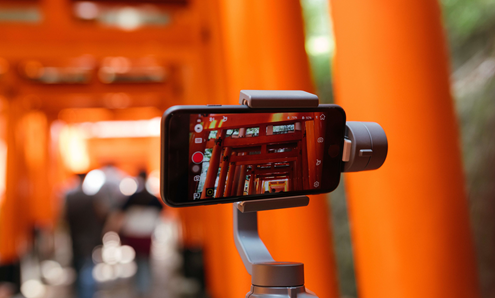A matter of months ago the idea of a virtual event might have sounded like something out of a sci-fi thriller set decades in the future, but at the back end of 2020 virtual events have become the new normal.
Lord knows we’ve all got to grips with Zoom calls this year, in fact, by the end of November 2020 the platform reported a whopping 1.7 million daily active users in the UK alone. The takeaway? Virtual events are where it’s at.
But what are they? How can you host your own? And most importantly, how do you ensure it’s top-notch? We’ve got all the answers and more, so let’s get to it.
What is a virtual event?
Any pre-arranged meet-up which takes place digitally rather than face-to-face is classed as a virtual event.
A whole host of different online activities fall under the umbrella, from small-scale and intimate get-togethers, to much larger sessions with 100s or even 1,000s of attendees.
Types of virtual events
To get your creative juices flowing let’s take a look at some of the types of virtual events you could host.
Tutorials
There’s no better way to highlight your in-depth expertise and authority than to show it. Demonstrating how your product works via a virtual event will achieve the above as well as show your customers you truly care about their satisfaction.
You could launch a new product with a tutorial and answer questions live while you’re at it, if nothing else it will really help to skyrocket your early marketing efforts.
How-tos
Not every virtual event needs to be about selling your products or services, but can also be useful for providing the ever-important value modern-day consumers crave.
So, why not teach them a new skill via a virtual event? For example:
- A landlord might host a cocktail mixing event
- A beautician could show how to do the perfect manicure, or
- A cafe owner might host a live bake-along.
The options are endless, but how-tos are popular with consumers looking to expand their repertoire and they’ll work wonders for your reputation.
Classes & workshops
Similarly, virtual classes are super popular right now, unsurprising since no one has been allowed to leave the house for a while.
Besides giving consumers what they want, you could also boost your bottom lines while you’re at it with a virtual class and charge a small participation fee. Examples include:
- A live yoga class
- A masterclass in perfecting bread making
- A workshop for crocheting beginners, etc.
Remember, these don’t have to be one-off events but could bring a recurring income stream each week if successful.
A look behind the scenes
Hands up if you love a good nosy - we’re not ashamed to say we’re guilty, so offering a behind the scenes tour of what goes on in your business is a top virtual event idea.
You don’t need to run a museum or art gallery for this to appeal to the masses, simply showing consumers what goes on behind closed doors and the ins and outs of how your business is run will offer excellent ‘culture content’ - and today’s shoppers love that.
You could tour your office, workshop, the factory where your products are made, or even the warehouse consumer goods are shipped from - show the people behind the products and really highlight the personal side of your business.
Ask me anything
You might have seen these sorts of virtual events taking place on your social media feeds, and they’re always big hitters with consumers.
Ask me anything (AMA) events are designed to get your followers engaged and interested in you and your business. Think of them as a modern-day Q&A where you can really showcase your personality, that your business is transparent and reliable, and inform consumers while you’re at it.
Games and contests
Lastly, sprinkle a bit of light-hearted fun into the mix by hosting live game nights or interactive contests. Consumer engagement is mega important these days, shoppers want to feel that connection to a brand and this type of event is the perfect way to achieve it.
Ways to host a virtual event
You’ve got plenty of options when it comes to how to host your virtual event. Now we’re living in such a digitally oriented and tech-savvy world, there’s been an explosion of platforms on offer for you to choose from.
Some are better suited to the likes of large-scale business conferences online, whereas others are ideal for small businesses wanting to make a digital splash - we’ll focus on the latter.
Social live streams
Probably the most popular platform to hold a virtual event on is social media - the daily user numbers are staggering across all the major sites, so you’re sure to reach a wider audience for your small business by focusing on the big names like Facebook, Twitter, Instagram & TikTok.
They all offer live video features and according to Facebook alone (the biggest platform), live videos draw in six times more user-engagement than ordinary videos posted to the site.
Good to know: in many cases, your followers will be notified when you go live on your social page and this can be great for upping participation and reach.
Most social live streams give you access to real-time info on attendee numbers and comments which will give you an idea of how successful your event is as well as the opportunity to interact with your followers in real-time - a win-win.
Top tip: on some platforms, you can go live with another person, perfect if you want to co-host your event with a colleague or business partner.
Social stories
Sticking on the theme of social, stories are the ideal place to share short-form tutorials, interviews and more.
You can film them in real-time but the beauty is they’ll be available to view afterward for anyone who missed out on the live event. Plus, you can save them to your page for anyone who’d like to refer back to your content at a later date.
Instagram, TikTok, Snapchat, and Facebook all offer a stories function, and using the feature you can add special effects, stickers, and filters to really add a unique and fun element to your event.
Live tweeting
Live tweeting is when you follow a live event such as a TV programme or sports event and tweet your responses in real-time in order to spark a discussion with your followers.
This type of virtual event is super easy, it doesn’t require too much forward planning on your behalf because you’re essentially tagging onto a pre-existing event and using it to leverage your consumer engagement - bonus!
Just don’t forget to let your followers know you’ll be live-tweeting in advance so they can participate when the time comes, and always use hashtags to help people both find and follow the conversation.
6 top tips for nailing it
Hopefully at this point we’ve got your cogs turning and your brain is full of great ideas for hosting your next virtual event. Before we leave you to it, we wanted to share our top tips for ensuring it’s a roaring success.
1. Plan, plan, plan
We’re all familiar with the old adage proper planning prevents poor performance, right?
A strategy is key, so start out with a clear objective of what you’re seeking to achieve by hosting a virtual event, it could be upping engagement, followers, or revenue - whatever it is, set it in stone up front.
Having your goal outlined will help you plan the perfect event to achieve it.
2. Timing is key
There’s little point in planning a showstopping virtual event if no one is available to participate, is there?
Do your homework on when most of your followers are likely to be free and online, and aim to host your event then.
- Are there any big events on the same day that are likely to steal your thunder? Think about big sports events, TV show finales, cultural celebrations, etc.
- Will your target audience be busy at certain times in the day? E.g. during school run hours, prime commuting times, etc.
Top tip: consider running a poll and give the power back to the people - run your event at the most popular time as voted for by your followers.
And remember, if there’s no such thing as the ideal time for your target audience, be sure to make your event accessible afterward so no one misses out.
3. Get marketing
People need advance notice if they’re going to be in a certain place at a certain time, so it’s mission-critical you get marketing your virtual event as soon as you’ve worked out what it’ll be and when.
You can do this on your social feeds, website, via emails, or even face-to-face, but the more people who hear about it the better.
It’s a great idea to create an event page on Facebook, as anyone who registers an interest will be reminded of the event in the run-up to the big day so you needn’t worry about them forgetting. Equally, Instagram allows you to create event countdowns, so you can really build anticipation using this tool.
4. Check your tech
If you’ve ever hosted a physical event you’ll know what it’s like to experience hitches along the way, well with a virtual event you can expect the odd glitch.
Do your best to avoid them as much as possible by giving your tech a thorough once over, including your internet speed, microphone, camera, speaker, etc.
The sooner you identify any areas for concern the sooner you can get to identifying solutions.
Remember, your audience mightn’t be tech whizzes either, so do your bit to help by creating a how-to guide for participants to keep everyone happy and avoid losing attendees.
5. Be accessible
It’s considerate, empathetic, and quite frankly just good practice to make your event as inclusive as possible, and this means ensuring everyone who wants to can join in.
- Where you can, include text to accompany speech.
- Make sure any text is a big enough font size.
- Use clear language.
- Provide visual descriptions where possible.
It’s a lovely touch to reach out to anyone who’s registered an interest and enquire about any additional needs they might have which could be a barrier to participation - then do whatever you can to overcome them. This might involve creating special materials or assets for them to use, but trust us, they won’t forget it.
6. Encourage two-way communication
We’ve said it before and we’ll say it again, today’s consumers love engaging with their favourite brands. So, encourage them to engage with you wherever you can during your virtual event.
You could ask for questions, comments, feedback, etc., just be sure to respond!
Top tip: it’s a great touch to shout-out to everyone who joins your event to really make them feel involved and appreciated.
We wish you every success in your next virtual event, and hopefully, our guide will help you smash it! For more resources on social media, marketing, and heaps more designed for small businesses head over to our jam-packed blog.





